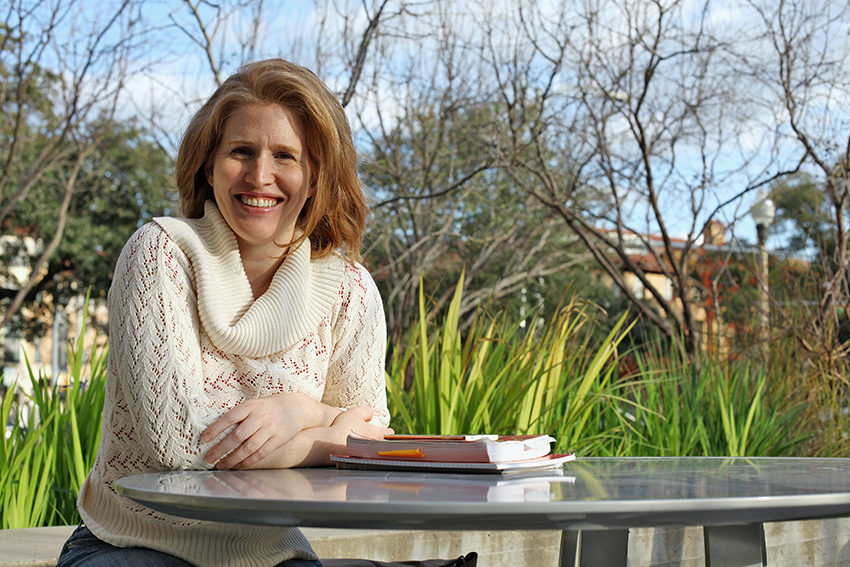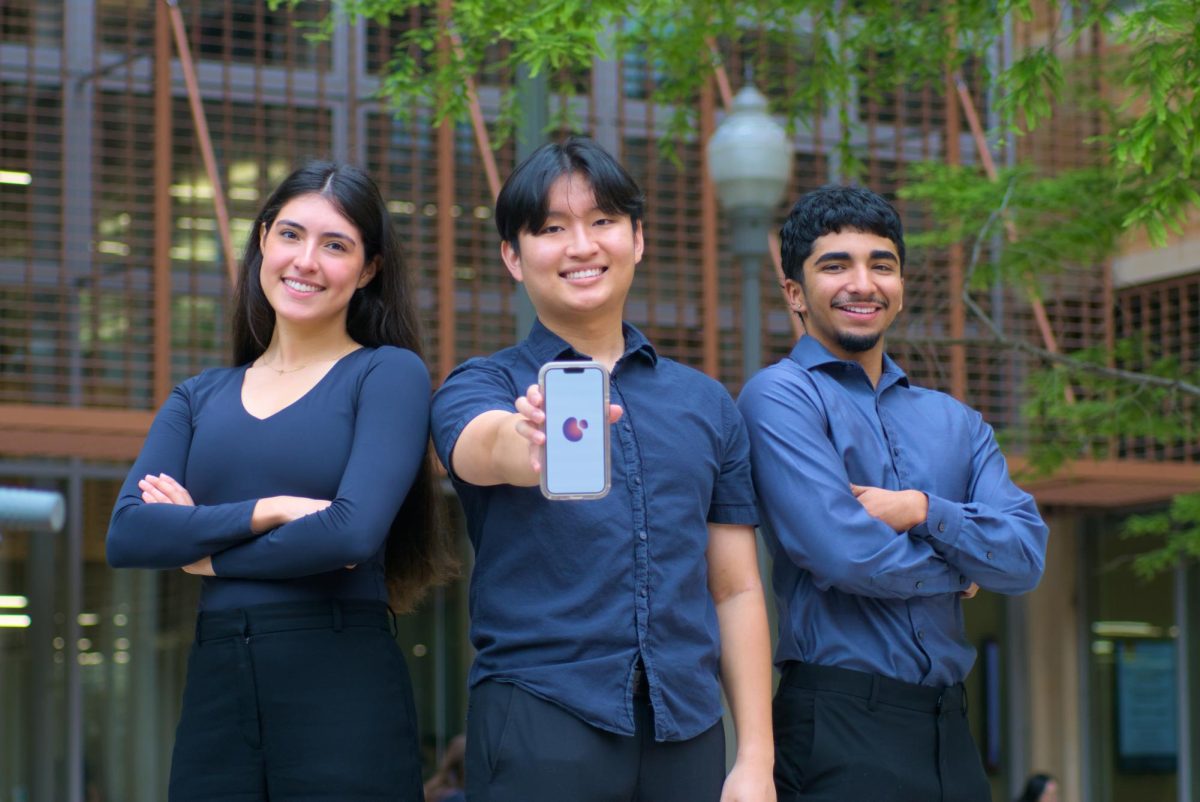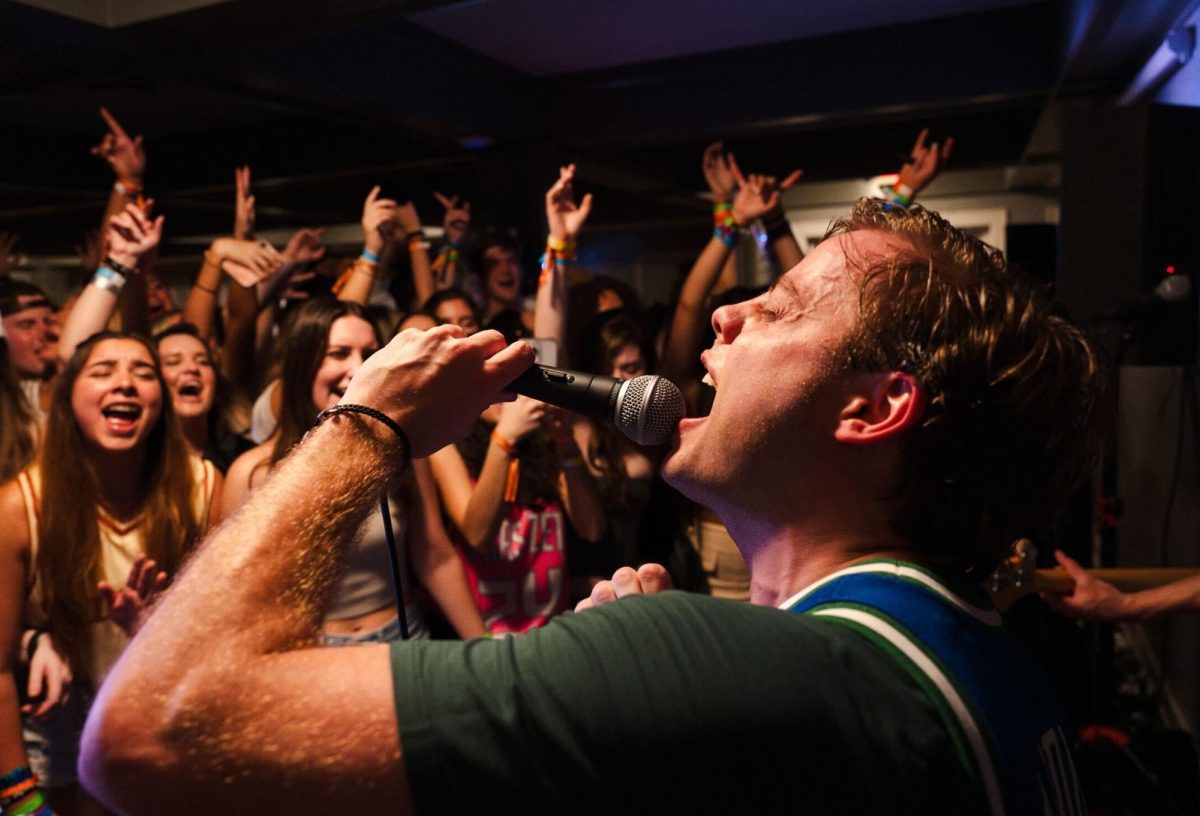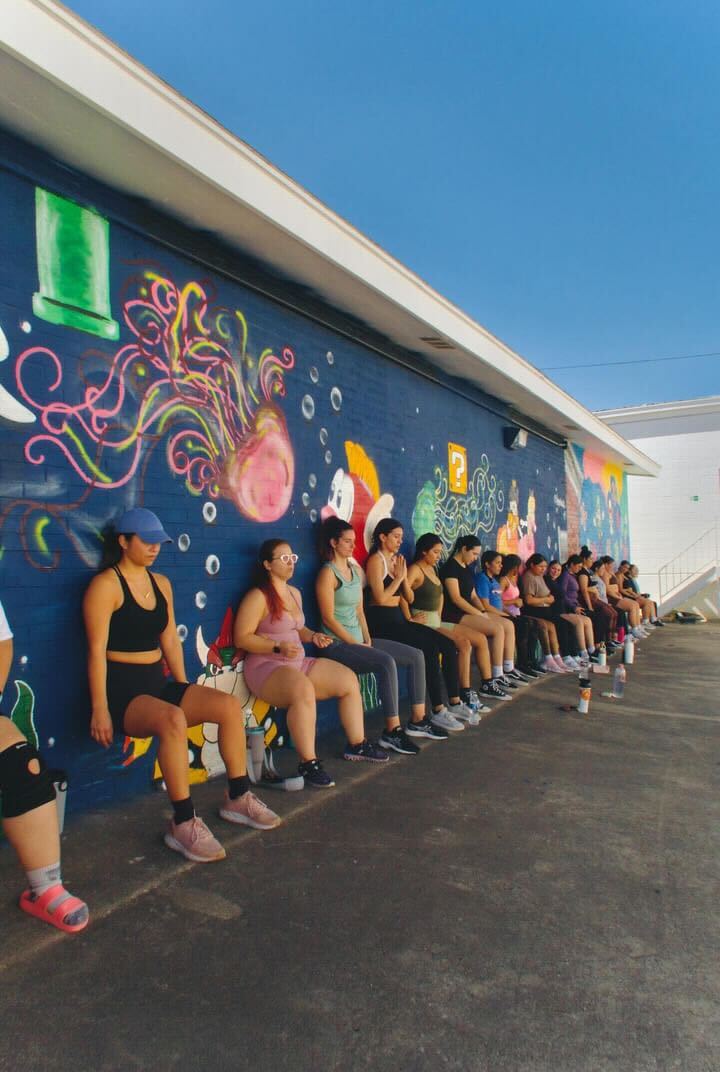Photos by Jesús Nazario, Interactives by Sam Limerick
After a brief stint as an au pair in France, over a decade of exploring the stand-up comedy scene in New York City and seven years working as a word processor at an Austin law firm, journalism student Amy Botelho found herself in an auditorium surrounded by teenagers as Katy Perry and Rihanna blared through the speakers. It was freshman orientation. She was 42 years old.
Botelho’s first college go-around hadn’t exactly gone as planned. When she found she wasn’t enjoying her history major or the quality of classes at her New York state school, she dropped out at 21 and packed her bags for New York City.
While trying her luck at acting and working as a legal secretary at a law firm, she discovered the stand-up comedy scene. As she began performing sets at comedy venues around town, she developed a love for writing and decided to return to school to hone her skills.
“I realized the world was only going to go so far for me in terms of my interest,” Botelho said. “I wanted to get my degree, which would open up doors and get me some writing experience.”
When she moved to Austin 10 years ago, she had her sights set on journalism at UT. But it took time to find financial stability. After she finally got out of debt in 2014, she applied, got accepted and turned in her law firm job for life as a full-time student.
Exchanging real-world jobs for textbooks, essays and mid-terms isn’t uncommon for people above the typical 18–22-year-old range nationally, but on the UT campus, the group makes up a small percentage of the undergraduate scene. Caught in a world of 20-somethings, these students must balance family commitments, jobs and adjusting to college life.
As of 2011, students over the age of 25 made up 38 percent of all undergraduate enrollment nationwide, according to the National Center for Education Statistics. In fall 2015, students 25 and older made up 4.3 percent of the undergraduate student population, compared to 5.7 percent in 2010, according to the UT Office of Institutional Reporting, Research and Information Systems.
In 2015, The Texas Higher Education Coordinating Board set out to ensure that 60 percent of Texans ages 25 to 34 have a certificate or degree by 2030. To reach this goal, the board, in part, aims to make going back to school easier and cheaper for adults. David Gardner, the deputy commissioner and chief academic officer of the Texas Higher Education Coordinating Board, said a number of factors — such as having kids or not being able to afford tuition — can prevent older individuals from earning their degrees.
“The longer it’s been since you’ve been out of high school, there is more time for certain life factors to come in,” Gardner said. “You may also lose some confidence. Part of what we have to do is encourage people and motivate people so that they have the ability.”
Like Botelho, many older individuals who choose to go back to school already have credit hours under their belt. The Coordinating Board reported in 2014 that 3.1 million Texans ranging in age from 25–64 had some college experience but no degree.
“Many of them unfortunately have debt because of that time, and we want to help them finish their certificate or degree,” Gardner said.
Gardner said receiving a higher education benefits people financially. Individuals 25 and older with a bachelor’s degree earn about $433 more a week than people who only have a high school diploma, according to the Bureau of Labor Statistics.
But adjusting to a student lifestyle at an older age comes with its challenges. Katherine Czar, group coordinator at the University’s Counseling and Mental Health Center, said the center hosts a group for nontraditional students called “Personal Explorations 25+,” during which students older than 25 can discuss problems they are encountering with a group facilitator and about six to eight peers. Czar said some common issues these students face are comparing themselves to their younger peers and feeling out of place.
As a reporter for KVR, the student-run TV station, Botelho is surrounded by younger students in both her classes and extracurricular pursuits. She said she rarely finds other older students like her on campus. The number of nontraditional-aged students, 25 and older, at UT has decreased by about 23 percent since 2010, according to IRRIS. With fewer students like her on campus, Botelho said she had to adjust to the age difference between her and her peers.
“This is past my time technically,” Botelho said. “I’m more used to socializing and being around the age range of professors, but it’s not appropriate for me to strike up friendships with them, even though I can relate to them and their phase of life more than the students.”


For 35-year-old anthropology student Joseph Leggett, the hardest part of his decision to attend UT has been the workload. In addition to being a full-time student, Leggett has a wife, two kids, ages 6 and 8, and maintains a part-time job as a youth director at First United Methodist Church of Bastrop. On the days he has classes, he makes the nearly 50-minute commute to campus from his home in Bastrop.
“It’s really hard because I don’t have a day off,” Leggett said. “I don’t have an hour off. I wake up, and I’m doing one of three things: studying for school, working as a youth director or helping with family stuff. That’s every day, all day.”
Leggett chose to attend UT after his corporate employer began downsizing. When the company gave him the option to either take a severance or work in a lower-level position, he saw it as his opportunity to go to school and improve his career.
“I’m not the type who can just get a degree online,” Leggett said. “I had to get something that I felt was worth the time and had some of my passion in it.”
After his time as an undergrad, he said he hopes to earn his Ph.D. in anthropology and eventually become a professor.
Since joining the UT community in spring 2015, Leggett said he’s enjoyed the challenging coursework but wishes he could be more involved by attending Anthropology Society meetings in the evenings. His packed schedule, however, doesn’t allow it.

“A lot of the extracurricular activities that I would love to be a part of, I just can’t,” Leggett said. “There’s just so much scheduling with my job and kids and living in Bastrop. Some students live here, and their schedules are free, and others are dads.”
One issue Botelho came across after coming back to school was making the transition to using more technology. She said a separate orientation geared toward older students that addressed things like how to use a computer and register for classes would have been helpful. When she first attended college in the ’90s, she wasn’t used to using her laptop to turn in assignments or having to check her email so often to receive updates from the University.
“It would be great if [the University] could adapt more or have more thought to the older students,” Botelho said. “If you start to cater [to them], I think you could get an influx of more people.”
The Texas Extended Campus is one way the University can be helpful to older students because it provides flexible class options. The Extended Campus — open to all students as well as individuals not admitted to the University — houses various programs that range from University Extension, which provides online and evening college credit courses, to the Center for Professional Education, which has non-credit courses and certificate programs for people seeking to advance their careers.
“As higher education evolves, the Texas Extended Campus is a place to try new things,” Extended Campus marketing director Kathleen Mabley said. “Every student who is able to get credit from us — each one of those is a success.”
The University Extension program provides online and evening college credit, but full degrees cannot be earned through the program alone. Mabley said these courses are aimed to help students fulfill core credits.
“What this program does best is help students build flexibility into their degree plans and into their schedule,” Mabley said.
Another way the University aids older students is through the senior citizen exemption. Like all Texas public schools, UT allows students older than 65 take up to six hours of undergraduate or graduate course credit for free if they request the exemption. These individuals could earn a degree for free if they take no more than six hours each semester and maintain a 2.0 GPA. Although the transition to a full-time student has been challenging as an adult, Leggett said he feels he made the right decision.
“I’m in the right place,” Leggett said. “This is what I should’ve done maybe a lot sooner, but I’m glad I got the opportunity to get out of a company that I hated and get redirected. Here, it’s wonderful, and hopefully it’ll turn into a career that’s fulfilling.”





















